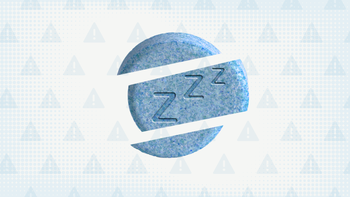How Does Melatonin Affect Your Heart, Liver, and Kidneys?
Key takeaways:
Melatonin is an over-the-counter supplement that’s often used to help with sleep problems.
There’s no evidence that melatonin is harmful to your heart, liver, or kidneys. But it can lower blood pressure and make bleeding more likely in some people.
Melatonin has other side effects and drug interactions to be aware of. It’s best to talk with your healthcare provider or pharmacist before taking melatonin supplements to make sure they’re safe for you.
Access savings on related medications
Table of contents

Melatonin is a hormone that’s made naturally by your body. It has several functions, but it’s best known for regulating your sleep-wake cycle. Some people take melatonin supplements to help with jet lag or other sleep disorders.
But supplements aren’t required to have the same safety information as prescription medications. So you may have questions about how melatonin can affect your health and whether it has any impact on your heart, liver, and kidneys. You can learn what you need to know below.
How does melatonin work?
Melatonin is produced by the pineal gland in the brain. Melatonin levels go up in response to darkness and go down in response to light. Higher melatonin levels help you feel tired and fall asleep.
Melatonin supplements typically contain a lab-made form of melatonin. Taking them can help you sleep, especially if your sleep trouble is related to jet lag, shift work, or naturally low melatonin levels.
Does melatonin affect your heart, liver, or kidneys?
Melatonin is sold as an over-the-counter (OTC) supplement for sleep. You may think that since it’s sold OTC, melatonin is safe for anyone to take — but that’s not always the case. OTC melatonin supplements can have side effects and drug interactions that you should know about. And if you’re wondering if melatonin can affect your heart, liver, or kidneys, it’s good to learn more before taking it.
Melatonin and your heart
There’s no current evidence showing that taking melatonin as directed can harm your heart. In fact, melatonin may even help protect the heart from damage in certain cases.
When it comes to overall heart health, however, there are a couple of things to consider when taking melatonin supplements:
Melatonin may lower your blood pressure. A review of clinical studies found that melatonin may lower blood pressure by a small amount. This effect may not be noticeable. But if you already take medication for high blood pressure, taking melatonin as well may lower your blood pressure too much. Symptoms of low blood pressure include feeling dizzy or weak. Stop taking melatonin and talk to your healthcare provider if you notice these symptoms.
Melatonin may have a blood-thinning effect. Melatonin may slow down how quickly your blood forms clots. If you’re taking other blood-thinner medications, adding melatonin may make bruising or bleeding more likely. Talk to your provider before taking melatonin if you take blood-thinning medication. And if you notice unusual bleeding or bruising while taking melatonin, let your provider know right away.
Melatonin and your liver
Melatonin also doesn’t seem to harm the liver, based on several clinical trials. As with the heart, melatonin may even have a protective effect on the liver in certain situations.
Melatonin and your kidneys
Melatonin may also help protect the kidneys. Studies have shown that melatonin can improve quality of life and prolong survival in people with chronic kidney disease. It may also help protect the kidneys from damage caused by certain medications, such as cyclosporine (Sandimmune) and vancomycin.
There doesn’t seem to be any evidence of a link between melatonin and kidney damage. But if you have kidney disease, it’s still a good idea to discuss melatonin with your healthcare provider before taking it.
What are the other side effects of melatonin to be aware of?
There are certain side effects that can come with using melatonin. These may be especially noticeable when you first start taking melatonin, or if you take large amounts.
Some of the most common melatonin side effects include:
Feeling sleepy during the day
Dizziness
Stomach upset
Nightmares or vivid dreams
Some of these side effects may get better over time. You can also try lowering your dose or taking a different form of melatonin. Your pharmacist or healthcare provider can help guide you, so let them know if you’re experiencing side effects from melatonin.
How long can you take melatonin safely?
The short-term use of melatonin is considered safe for most people. Melatonin doesn’t seem to be addictive or habit-forming, unlike some other sleep medications. We have less information about the long-term safety of melatonin supplements. Long-term use doesn’t seem to cause any serious problems, but more studies are needed to know for sure.
If your sleep problems last for more than a few weeks, it's best to see a healthcare provider. They can help make sure there isn’t a more serious problem causing you to have trouble sleeping.
Best practices for taking melatonin
It can take a few tries to find out how melatonin works best for you. Timing, dose, and setting are key to getting the most out of your medication.
Start with a low dose of melatonin. Take a low dose (0.5 mg to 3 mg) at first and increase it slowly over time, as needed. This will help lessen the chance of side effects. Doses of more than 10 mg daily aren’t recommended.
Take melatonin about 2 hours before bedtime. It takes a few hours for melatonin to work. So taking it in advance of your bedtime will help make sure it kicks in when you need it.
Avoid bright lights before bed. Dim the lights in your home, and avoid using electronic devices with screens. Light coming in through the eyes at night can suppress your melatonin production.
Practice good sleep hygiene. Avoid caffeine within 6 hours of bedtime. Try to go to sleep and wake up at the same time every day. And only use your bed for sleep and intimate activities. Having a good sleep routine can help melatonin work its best.
The bottom line
Melatonin supplements are commonly used for sleep problems. There’s no evidence that melatonin is harmful to your heart, liver, or kidneys when taken as directed. But it can lower blood pressure and make bleeding more likely, especially if you take other blood pressure or blood-thinning medications.
Melatonin does have other side effects and drug interactions to be aware of. So it’s best to talk with your healthcare provider or pharmacist before taking it. And let your provider know if you need melatonin for more than a few weeks at a time.
Why trust our experts?



References
Grubisic, M., et al. (2019). Light pollution can suppress melatonin production in humans and animals. Sustainability.
Hadi, A., et al. (2019). Effects of melatonin supplementation on blood pressure: A systematic review and meta-analysis of randomized controlled trials. Hormone and metabolic research = Hormon- und Stoffwechselforschung = Hormones et métabolisme.
LiverTox: Clinical and Research Information on Drug-Induced Liver Injury. (2020). Melatonin. National Institute of Diabetes and Digestive and Kidney Diseases.
Markowska, M., et al. (2023). Melatonin treatment in kidney diseases. Cells.
National Center for Complementary and Integrative Health. (2022). Melatonin: What you need to know.
Tobeiha, M., et al. (2022). Evidence for the benefits of melatonin in cardiovascular disease. Frontiers in Cardiovascular Medicine.
Tordjman, S., et al. (2017). Melatonin: Pharmacology, functions and therapeutic benefits. Current Neuropharmacology.
Zhang, J-J., et al. (2017). Effects of melatonin on liver injuries and diseases. International Journal of Molecular Sciences.
Was this page helpful?
Compare other insomnia drugs
Related Articles
Browse medications
View AllResearch prescriptions and over-the-counter medications from A to Z, compare drug prices, and start saving.























